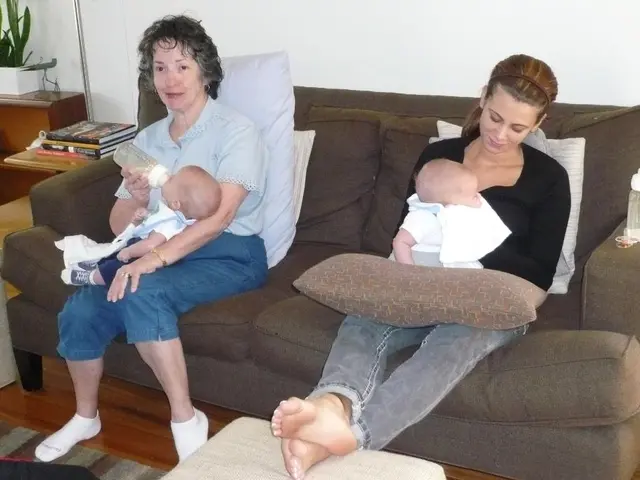Hospital Crackdown Leads to Forced Deportation of Pregnant Haitian Women and Children in Dominican Republic
In a blunt move, the Dominican Republic expelled scores of pregnant women, new mothers, and children back to the crisis-stricken Haiti while tightening its borders. In a brash statement, the Dominican authorities stated that 135 women and children were herded into a detention center for undocumented migrants on Monday before being shipped back to their troubled neighbor.
This draconian crackdown on illegal immigration coincides with the implementation of one of President Luis Abinader's contentious immigration policies. Now, medical personnel at National Health Service (SNS) hospitals are obliged to question patients for identification, a proof of employment, and a proof of residence. Immigration agents will then verify the documents at these hospitals. On Monday, 33 public hospitals steeled themselves for this new regulation, as up to 80% of public hospital births involving foreign mothers take place in these facilities.
The mass deportations were allegedly due to these new guidelines, according to Dominican authorities. They claimed in a press release that the deportees were treated kindly and with esteem, sent back on comfortable, secure buses only after they were discharged from the hospital and had a medical examination to ensure they were free of health risks.
Rights and health groups swiftly denounced this action, with the UN voicing worries on Thursday that other women and children in the Dominican Republic may now fear health authorities. "We are incredibly concerned about the potential impact on health," Stéphane Dujarric, spokesperson for the United Nations Secretary General, stated on Thursday. "This policy could have a rapid and adverse effect on those seeking healthcare who may not want to seek healthcare because they don't feel hospitals are safe."
Although every country has the right to fortify its borders, it is also essential for countries to "respect the dignity of other human beings," Dujarric added. The Dominican Medical Association chimed in on Instagram, asserting that such inflexible deportation rules for those with medical needs could endanger their lives.
The Dominican government maintained that no one would be refused medical care under the new protocol, but rights groups argue that patients in need of care may shun hospitals out of fear of deportation. "These individuals face immediate deportation after receiving care. This puts people's right to health, privacy, and physical safety at risk, and discourages vulnerable groups, such as pregnant women, children, and survivors of violence, from seeking essential medical treatment," Amnesty International stated on Monday.
Over the last six months, the Dominican authorities have expelled more than 180,000 people back to Haiti, a nation gripped by gang violence that has infected every facet of life. The Dominican Republic, which shares the Island of Hispaniola with its neighbor, has experienced an influx of migrants fleeing violence in Haiti, where essential supplies are struggling to meet the population's needs, and hundreds of schools have shut down.
Due to the rampant insecurity, dozens of health facilities have ceased operation in Haiti, with the latest being the University Hospital of Mirebalais. Earlier this month, gangs stormed the town, setting buildings ablaze and posing a risk to the hospital, forcing it to evacuate its staff and patients. The United Nations' top Haiti envoy María Isabel Salvador warned this week that Haiti is "approaching the point of no return." She added: "Without timely and decisive international support, the violence will continue to escalate, and Haiti could face total collapse." Jessica Hasbun contributed to this report.
Dark Creeping Shadows
With human rights activists raising alarm over the Dominican Republic's immigration measures, it appears that racial profiling and discrimination against Haitian migrants have escalated. Moreover, the mandatory identification checks at hospitals are undermining the right to health, deterring vulnerable groups such as pregnant women, children, and survivors of violence from seeking essential medical treatment, and compromising patient privacy and physical integrity by making healthcare contingent upon immigration status. These policies threaten to exacerbate existing health disparities and further marginalize already vulnerable populations in the Dominican Republic.
- The Dominican Republic has been expelling pregnant women, new mothers, and children back to crisis-stricken Haiti, tightening its borders in a questionable move.
- A controversial immigration policy by President Luis Abinader requires medical personnel to question patients for identification, proof of employment, and proof of residence at National Health Service (SNS) hospitals.
- In response to the mass deportations, Amnesty International argued that patients in need of care may shun hospitals out of fear of deportation, risking their right to health, privacy, and physical safety.
- The Dominican Medical Association voiced concerns that inflexible deportation rules for those with medical needs could potentially endanger their lives.
- UN spokesperson Stéphane Dujarric stated that he is concerned about the potential impact on health, as this policy could have a rapid and adverse effect on those seeking healthcare in the Dominican Republic.
- The Dominican government maintains that no one will be refused medical care under the new protocol, but rights groups argue otherwise, stating that these individuals face immediate deportation after receiving care.
- The influx of migrants from Haiti, facing gang violence and struggling essential supplies, has increased in the Dominican Republic, leading to tensions in general news, crime and justice, education and self-development, politics, learning, mental health, fitness and exercise, health and wellness, and international relations.








